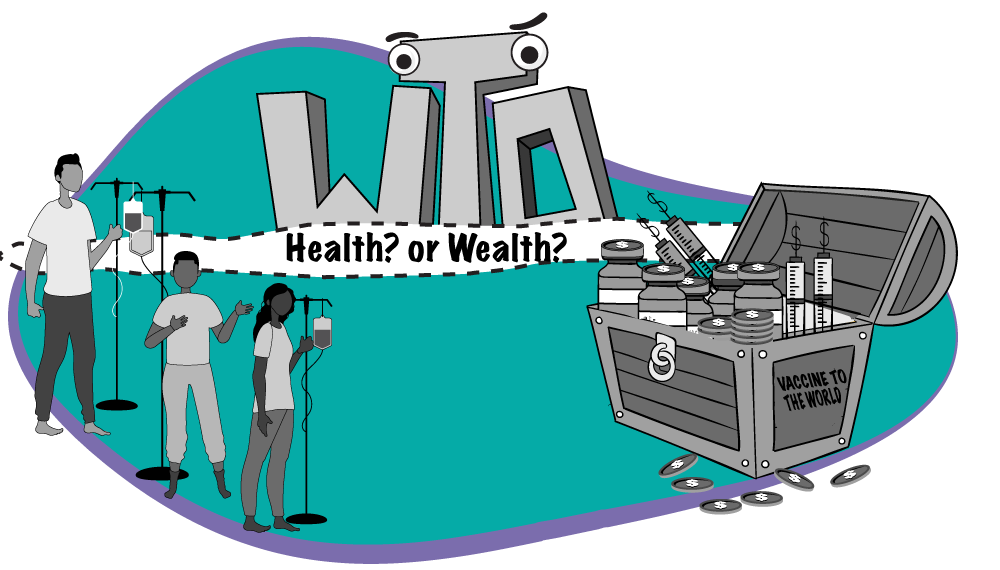Health or Wealth? The Raging Debate of Patent Waiver on Covid Vaccines

In October 2020, India and South Africa submitted a proposal to the World Trade Organization (WTO) for waiver of patents on vaccines against the SARS Covid19 which engulfed the world.
The proposal was welcomed by almost 120 developing nations and strongly objected to by the world’s strongest economies including UK, Australia, Germany Japan, Norway, Singapore and the US. Russia and China were open for a dialogue on the same.
However, in May 2021, the US government announced its support for temporary waiver of patents on covid vaccines citing “extraordinary times call for extraordinary measures”.
A patent is a lega+l right / protection given to the owner of an invention to exclude others from making, using, or selling it for a fixed time period.
Currently, only pharmaceutical companies which own patents are authorized to manufacture Covid vaccines. Pharma giants AstraZeneca, Johnson & Johnson, Moderna, Pfizer, BioNTech, GlaxoSmithKline and others have developed vaccines such as Covishield (manufactured by Serum Institute of India), Covaxin, Sputnik and others.
Globally, the second wave of the Covid19 has struck stronger than the first one. Several mid income countries like India and Brazil have been caught off guard. Epidemiologist, virologists, scientists and researchers are unanimous that the epidemic can be firmly dealt with either by herd immunity or by vaccinating en mass the population of affected countries. Simply put, people should have either been affected by the virus or been vaccinated against it leading to herd immunity where the virus effect would be negated.
A look at the pros and cons of patent waiver on vaccines.
Pros:
- There is shortage of vaccine supply especially in developing countries like India. Extremely populous countries will have to undertake vaccination drive on war footing to deal with the continuing pandemic. Given the unprecedented and aggressive spread of the virus, sharing know-how of making vaccines to all countries would enable them ramp up bulk production and administer the same to the population. Millions of lives could be saved.
- There is inequal distribution of vaccines between developed and developing countries. The Director General of World Health Organization (WHO) pointed out that 82% of the total vaccines produced went to upper middle class / high income countries which constituted 11% of the world’s countries. Only 0.2% were made available to middle / low income countries. This dichotomy is unacceptable considering that low income countries have most population in the world. Waiving patents on vaccines could enable speed up production and ensure equal access to all sections of the world.
- Sharing the know-how to manufacture vaccines may regulate the prices at which they will be made available to developing countries. This could ease the burden on the already affected economies of developing countries.
Cons:
- Pharmaceutical giants and drug makers are of the view that mere sharing know-how will be of no use as manufacturing vaccines is a more complex process requiring advanced technologies, specialized / sophisticated equipment, raw materials and highly trained specialists / professionals. If there is dearth of these, then the know-how will not help. There is concern regarding the quality of vaccines manufactured in developing countries once know-how is shared. Vaccines with low quality may not produce the desired effect even if administered.
- Most of the costs involved in vaccine development is incurred during the research & development (R&D) stage as it takes years, many times decades to develop them. Testing / clinical trials and thereafter regulatory approvals take time as well. Only after all these stages are crossed, can the vaccine be manufactured. The cost of manufacturing is a fraction of this entire process. Pharmas are objecting to patent waiver on the grounds that despite this herculean effort, waiving patents on vaccines may discourage research and innovation which are detrimental in the larger picture.
- Above all, in capitalist countries, Pharmaceutical industry is a large source of revenue for the government. By keeping their know-how to themselves, they retain the power to finalize the prices. They have the upper hand in deciding deals within and outside the countries.
The way out?
India has produced 21% of the world’s Covid-19 vaccines. It has exported nearing 6 crore vaccines to more than 70 countries. Despite being an important manufacturer of the vaccine early on in the fight against the pandemic, the nation is facing shortage at home.
Countries such as Germany, though, are beginning to understand the impact of Covid 2.0, they favour developing manufacturing capacities in their respective countries and exporting final vaccines to other countries. Several other countries are of the view that a balance has to be drawn between the transfer of know-how, investment in setting up manufacturing facilities, across the world, regulation of pricing and retaining rights over their innovations.
A final decision will be have to be taken by the World Trade Organization (WTO) which governs and facilitates complex trade agreements amongst the 164 member nations. ALL members will have to approve for the proposal of temporary patent waiver on Covid vaccines to become a reality. The only time such a temporary waiver was allowed was close to 4 decades ago for addressing the then rampant HIV/ Aids cases (which was not a pandemic). Health or wealth? The WTO has to decide and act soon.

